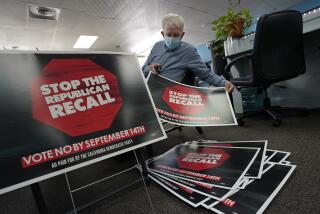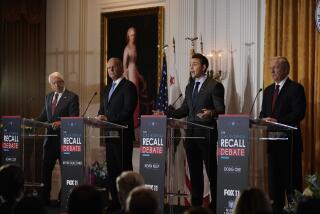Political Bias Drives Justices’ Delay of Recall
- Share via
Having a rule of law that people can rely on with confidence is necessary for democracies to succeed. Unfortunately, three justices of the U.S. 9th Circuit Court of Appeals put the rule of law aside Monday in favor of their own political ideology when they ruled on the recall.
After all, the rules governing this election were written long before Gov. Gray Davis was even elected. The California Constitution requires the state to hold a recall election within 60 to 80 days after the signatures petitioning for a recall have been certified. When it was determined in July that there were more than enough signatures to qualify, the lieutenant governor had little choice but to schedule the recall vote for Oct. 7.
As the political pundits and pollsters have been noting for weeks, when you hold an election can have a substantial effect on the outcome. Given this opportunity for manipulation and abuse, it is critically important that the rules be followed. The 9th Circuit, however, has chosen instead to rewrite the rules in the middle of the contest in a way, most observers agree, that will benefit the Democrats
The 9th Circuit argued that this state’s election rules did not matter because of the risk that certain votes (40,000 to be exact) may not be counted -- if, that is, voters fail to follow the proper instructions for using a punch-card machine. The goal of making sure every vote counts -- even when the voter does not follow the instructions -- is laudable, and it is something every registrar is working hard to achieve. It is, however, ultimately unattainable. Election perfection is not required by the Constitution. No election in this state, or this country, has ever been perfect. If states are required to guarantee that voters won’t make mistakes before elections can be held, then no election will ever be held.
In reaching its result, the 9th Circuit ignored well-settled law. The U.S. Supreme Court has long recognized the need to give individual localities the flexibility to adopt voting systems that are best tailored to their unique circumstances, even though some counties will inevitably be better than other counties at counting. This has never been considered a constitutional problem by Supreme Court justices on either side of the ideological spectrum. This was affirmed by the Supreme Court in Bush vs. Gore by both the majority and the dissent. The majority explicitly held that its decision did not change the right of different counties to use different systems. Justice John Paul Stevens, in his dissent, reaffirmed the right of states “to delegate to local authorities certain decisions with respect to voting systems,” even though there may be “enormous differences in accuracy.”
It is truly shocking that the 9th Circuit could simply ignore what the Supreme Court had already said on this issue, in order to upset an election process that is already divisive.
Nor does the 9th Circuit decision make sense practically. The 9th Circuit enjoined the Oct. 7 election because of imperfections in the voting systems, even though they were the same systems that elected Davis in the first place -- not once but twice. For some reason, the systems that put him in office are somehow not good enough to remove him from office.
More important, the 9th Circuit ignored the undisputed evidence that the new systems that would be implemented in March 2004 were untested at best and would probably produce additional voting problems.
What will be unveiled in March is not the latest generation of touch-screen voting, but an InkaVote system that has never been used anywhere in the country.
Moreover, the InkaVote system apparently can’t accommodate the normal federal, state and local races, both primary and general, and the 135 recall candidates as well. That means that for the recall, we’ll be back to hand-counted paper ballots, the most unreliable way of counting votes and the reason voting machines were invented in the first place.
Ultimately, Davis supporters and recall supporters must agree that prolonging the political crisis in this state is not in the best interest of California, especially given the tremendous fiscal problems this state is facing.
If recall is truly the product of a fringe element, then the majority of voters ought to have a right to say so promptly, so the governor can focus on doing his job, instead of trying to keep his job.
If, on the other hand, the majority of Californians want Davis out, then they have a right to say so now, so a successor can be elected.
Either way, Californians should have the right to vote Oct. 7.
More to Read
Get the L.A. Times Politics newsletter
Deeply reported insights into legislation, politics and policy from Sacramento, Washington and beyond. In your inbox twice per week.
You may occasionally receive promotional content from the Los Angeles Times.







